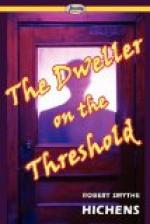He had never been there before. As he drew near he found people flowing toward the great church on foot, in cabs and carriages. Evidently Mr. Harding had attractive powers, and Malling began to wonder whether he would have any difficulty in obtaining the seat he wanted, in some corner from which he could get a good view both of the chancel and the pulpit. Were vergers “bribable”? What an ignoramus he was about church matters!
He smiled to himself as he paid the cabman and joined the stream of church-goers which was passing in through the open door.
Just as he was entering the building someone in the crowd by accident jostled him, and he was pushed rather roughly against a tall lady immediately before him. She turned round with a startled face, and Malling hastily begged her pardon.
“I was pushed,” he said. “Forgive me.”
The lady smiled, her lips moved, doubtless in some words of conventional acceptance, then she disappeared in the throng, taking her way toward the left of the church. She was a slim woman, with a white streak in her dark hair just above the forehead. Her face, which was refined and handsome, had given to Malling a strong impression of anxiety. Even when it had smiled it had looked almost tragically anxious, he thought. The church was seated with chairs, and a man, evidently an attendant, told him that all the chairs in the right and left aisles were free. He made his way to the right, and was fortunate enough to get one not far from the pulpit. Unluckily, from it he could only see the left-hand side of the choir. But the preacher would be full in his view. The organ sounded; the procession appeared. Over the heads of worshipers—he was a tall man—Malling perceived both Mr. Harding and Chichester. The latter took his place at the end of the left-hand row of light-colored oaken stalls next to the congregation. Malling could see him well. But the rector was hidden from him. He fixed his eyes upon Chichester.
The service went on its way. The music was excellent. A fair young man, who looked as if he might be a first-rate cricketer, one of the curates no doubt, read the lessons. Chichester intoned with an agreeable light tenor voice. During the third hymn, “Fight the Good Fight,” Mr. Harding mounted into the pulpit. He let down the brass reading-desk. He had no notes in his hands. Evidently he was going to preach extempore. After the “In the name of the Father, and of the Son, and of the Holy Ghost” had been pronounced, Malling settled himself to listen. He felt tensely interested. Both Mr. Harding and Chichester were now before him, the one as performer—he used the word mentally, with no thought of irreverence—the other as audience. He could study both as he wished to study them at that moment.
Chichester was a small, cherubic man, with blue eyes, fair hair, and neat features, the sort of man who looks as if when a boy he must have been the leading choir-boy in a cathedral. There was nothing powerful in his face, but much that was amiable and winning. His chin and his forehead were rather weak. His eyes and his mouth looked good. Or—did they?




